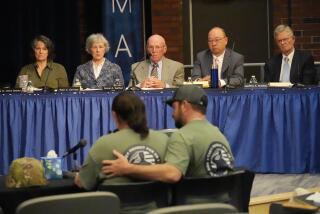For Families, Waiting is Over but Pain Is Not
WASHINGTON — As the Sept. 11 commission issued its findings Thursday, many of the families of those who died in the 2001 terrorist attacks voiced anger at the 14 months it took to look into the deaths of about 3,000 people. They spoke of their fury that no individual was held accountable and of their frustration that the commission discounted the idea that firefighters died in the World Trade Center because of faulty radios.
But all seemed to agree on one point: The commission, led by former New Jersey Gov. Thomas H. Kean, showed deference to the grieving families as it aggressively probed the deadliest terrorist attacks on U.S. soil.
“As far as I’m concerned, that was the best man for the job,” Nikki Stern, executive director of the group Families of September 11, said of Kean.
Rather than merely providing fodder for the 2004 election, the report “displays a remarkable consensus and a remarkable willingness to submerge the ego on the part of a greater good,” said Stern, whose husband, Jim Potorti, died in the north tower of the World Trade Center.
In offering praise, family members were thanking a commission created largely because of their own efforts. The Bush administration and Congress had been reluctant to authorize the panel. They did so 14 months after the attacks, only after pressure from victims’ families in New York, Washington and Pennsylvania. The panel spoke deferentially about the victims, spoke privately to their survivors and kept them abreast of its efforts.
Many family members expressed the cautious hope that the commission’s findings would lead to change. But they also noted that those hopes were based on the uncertain prospect that government officials would follow up on the series of nonbinding recommendations from the commission.
“They’re happy, because it’s the only game in town,” said Sally Regenhard of the Skyscraper Safety Campaign, referring to the family members’ perception that the panel was the only government entity probing the terrorist attacks.
“The commissioners throughout this arduous process showed a great deal of compassion, respect and concern for the families of the victims. And while doing that, they always honored our loved ones who died,” said Regenhard, whose son, probationary firefighter Christian Michael Otto Regenhard, was killed in New York.
Among family members interviewed Thursday, even the most vociferous critics offered a preamble praising Kean and the panel before assailing some of its findings.
“I’m very grateful to the commission, to Gov. Kean. The commission has shown a great willingness to relate to the family steering committee,” Regenhard said.
Like most of the family members interviewed after the commission’s report, she had a major complaint. The commission ruled out nonfunctioning radios as a key reason that many firefighters were killed in the south tower, despite reports that the emergency workers failed to hear warnings the building could collapse.
“I want to thank these people for their work,” Regenhard said of the commission. “I want to thank the staff. But I feel they kowtowed to the former administration” of New York Mayor Rudolph Giuliani.
Few of the surviving relatives expressed confidence that the panel’s work would ensure that some other U.S. family would avoid similar suffering. But many held out hope.
For Tom Roger, whose 24-year-old daughter, Jean, was called to replace a fellow flight attendant 15 minutes before doomed American Airlines Flight 11 was to depart Boston for Los Angeles, there is now the hope that in future attacks someone will have to take responsibility -- even though the commission assigned blame to organizations, but not individual officials.
“Truman said, ‘The buck stops here.’ But certainly with George W. Bush the buck stops nowhere,” Roger said. “That attitude is so pervasive throughout government that it’s no wonder I’s weren’t dotted and T’s weren’t crossed. Nobody was in charge. I think some of the recommendations that they’re making are directed right at that major problem.”
Some took solace in the broad criticisms the report offered for intelligence agencies and in one recommendation in particular: To place a single, new leader over the CIA, the Defense Intelligence Agency and other intelligence agencies that have been widely accused of poor coordination.
“They did say that it was at high levels, that there was insufficient resolve, insufficient oversight, inadequate policy, everything. They pointed fingers without naming names,” said Beverly Eckert of Stamford, Conn., whose husband, Sean Rooney, died in the south tower of the World Trade Center.
“I think the really important thing that they will do is change the way intelligence agencies operate,” Eckert said. “We really have to stop these terrorists by gathering effective intelligence, by infiltrating and stopping the plot before it has any momentum whatsoever.”
Several family members lamented hearing no more than the lone apology offered by former White House counterterrorism advisor Richard A. Clarke, which he made during a commission hearing.
“We did get one. And that went a really long way. It’s just unfortunate there wasn’t more,” said Carie Lemack, the 29-year-old secretary of Families of September 11. Her mother, Judy Larocque, 50, was a passenger on one of the planes that struck the World Trade Center.
“My mother was murdered,” she said. “She won’t be there at my wedding. That loss is permanent. I don’t want that to happen to someone else.”
More to Read
Sign up for Essential California
The most important California stories and recommendations in your inbox every morning.
You may occasionally receive promotional content from the Los Angeles Times.










